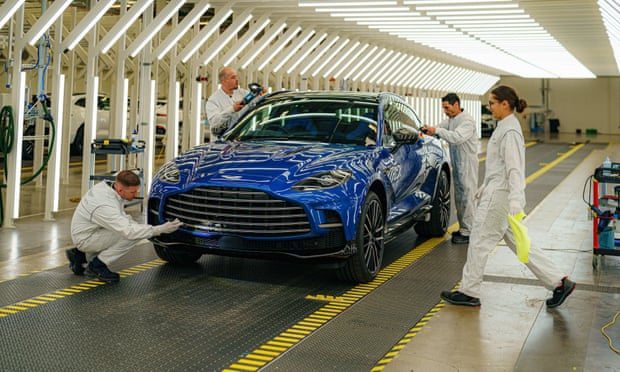Aston Martin’s shares slide as it discounts rights issue in debt battle
British carmaker hopes money will allow it to reduce debt payments and invest in new electric models

Aston Martin shares slumped by nearly 16% after the British sports carmaker revealed that it would give a deep discount on a £576m rights issue as it tries to reduce its big debt pile.
The luxury carmaker on Monday revealed that investors would be able to buy more shares at 103p a share, a steep 78% discount to the 480p closing price on Friday. Its shares closed down 15.6% at 405p early on Monday.
The rights issue was first revealed in July as part of a total £650m fundraising, with Saudi Arabia’s Public Investment Fund (PIF) becoming the second-largest shareholder through a share placement.
Lawrence Stroll, the billionaire fashion mogul who led the 2020 bailout, previously said he had no concerns about taking investment from the PIF. The fund is led by the Saudi crown prince, Mohammed bin Salman, who is alleged by US intelligence services to have ordered the 2018 murder of journalist Jamal Khashoggi.
Aston Martin hopes the money will allow it to reduce debt payments and invest in new electric models. The company has lagged behind some rivals in working on electric cars, relying instead on sales of petrol sports cars and newer sports utility vehicles.
The company’s shares have lost almost four-fifths of their value over the past 12 months as it has struggled with high debt payments and stubbornly low sales as well as the supply chain problems faced by companies around the world.
Aston Martin’s shares started trading at £19 when it floated on the London Stock Exchange in October 2018. However, since then it has experienced a torrid time under three different chief executives.
High listing costs meant it required a bailout in early 2020. That bailout arrived just as the coronavirus pandemic started, forcing its factory to shut and forcing it to go through a painful period of cutting the number of cars held by dealers.
The borrowing it agreed during that bailout left it with “a significant debt burden and associated interest costs”, dragging on profitability, it said on Monday.
It said there was a “challenging operating environment, affected by the war in Ukraine, Covid-19 lockdowns in China, as well as continued supply chain and logistics disruptions”.
Aston Martin said it had made operational improvements, including cutting the cost of making a car by 20% and increasing the company’s brand visibility by licensing its name to a Formula One racing team.
The company aims to eventually make 10,000 cars a year, and to generate positive free cashflow by 2024.